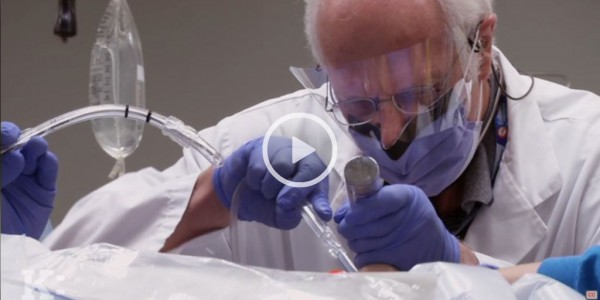Uncovering the heroes
When asked what the biggest lesson he learned was while filming Emergency Room: Life and Death at Vancouver General Hospital, series producer David Moses says the answer is easy.
“The most important thing I’m taking away from this experience is to cross at crosswalks and look both ways,” he says. “No joke. Seriously, the number of ped (pedestrian) strikes that came up during the filming was sobering.”
Multitude of humanity
The documentary series, which aired its final episode on Tuesday night, is a behind-the-scenes look at the people and life-saving work being done at the VGH emergency room (ER). Director Kevin Eastwood says he was overwhelmed by the “amazing” stories constantly taking place behind the Vancouver ER doors.
“Not to sound cheesy, but I couldn’t believe the multitude of humanity that comes through the doors at emergency,” Kevin says. “There are so many different people from different walks of life – it’s kind of the great social equalizer, especially at VGH where there’s such a broad cross section of society.”
“To be exposed to so many different types of people, in an acute situation where emotion and personal health is at a peak, it’s very different from any other non-fiction or dramatic project I’ve ever done,” he adds.
Unique experience
Unlike scripted and yes, reality TV, Kevin says it was a unique experience having the stories and characters already “written” before filming.
“Here, you didn’t need to exacerbate anything or try to construct anything, which is what a lot of reality TV is,” he says. “It was just us, sitting back, trying to stay out of the way and documenting a lot of incredible stories constantly unfolding in front of us.”
David says something similar.
“It’s unlike any series I’ve ever worked on before,” the producer says. “The biggest job for any storyteller is creating reasons for people to care about the characters and the story. Whereas, for this series, all of those elements are built in. And whether a show is scripted or non-scripted, a lot of it is about drama, about people struggling against an obstacle they have to overcome – in the ER, these things are already built in.”
For six months, David, Kevin and a four to five-person crew managed to capture the emotion and tales of the ER while not getting in the way of the important care being delivered. Kevin says it was a challenge learning the “rhythms and pace of the environment” to capture the moments safely.
“I think we pulled it off and proud that we did,” he says. “We tried to be non-present and not affect the real work happening there, the treatment of patients.”
They deserve recognition
The director says he is proud of how the six-part series shows the heroic, humanistic side of the ER.
“It’s impressive how (the staff) are confronted with that much tragedy and suffering and death and not be a puddle on the floor…it’s incredible,” he says. “And to face that every day, for 12-hour shifts…they deserve recognition.”
“It’s truly impressive and it just shows you don’t have to search far to find heroes.”

